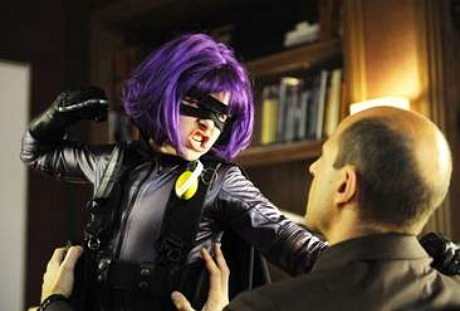“Shall I have feelings, or should I pretend to be cool?,” Roger Ebert asked yesterday in his review of Matthew Vaughn‘s Kick-Ass. “Will I seem hopelessly square if I find [this film] morally reprehensible and will I appear to have missed the point?”

My response to Ebert, of course, is that he’s not hopelessly square at all — he’s sharp and shrewd and never misses a trick — but (and this is a big “but’) by the laws of the comic-book action realm Kick-Ass isn’t morally reprehensible, it’s just “whoaa, dude!” But if you don’t get that realm you’ll never get that feeling, and people like Roger will look at you on the street like there’s something really and truly wrong with you.
“Let’s say you’re a big fan of the original comic book, and you think the movie does it justice,” Ebert says. “You know what? You inhabit a world I am so very not interested in. A movie camera makes a record of whatever is placed in front of it, and in this case, it shows deadly carnage dished out by an 11-year-old girl, after which an adult man brutally hammers her to within an inch of her life. Blood everywhere. Now tell me all about the context.”
The context is this: the comic-book action realm is about itself, which is to say a world of powerless young guys and their emotionally arrested elders who want to hold on in a sense to that feeling. It’s about notions of flash and dash and washboard abs, of studly lethal force and villains who seem to fit the same mold time and again. Nothing in the comic-book action realm represents anything “real” (including 11 year-old girls) because it’s all about stupid simplicity — about moral payback and lurid emotions and a visual ripeness that doesn’t exist anywhere else. It’s also about a huge need for reality-enhancing myth. For archetypes, intensity, testosterone, etc. And imagination, of course.
“The movie’s premise is that ordinary people, including a high school kid, the 11-year-old and her father, try to become superheroes in order to punish evil men,” Ebert writes. “The flaw in this premise is that the little girl does become a superhero. In one scene, she faces a hallway jammed with heavily armed gangsters and shoots, stabs and kicks them all to death, while flying through the air with such power, it’s enough to make Jackie Chan take out an AARP membership.
“This isn’t comic violence. These men, and many others in the film, are really stone-cold dead. And the 11-year-old apparently experiences no emotions about this. Many children that age would be, I dunno, affected somehow, don’t you think, after killing eight or 12 men who were trying to kill her?
“I know, I know. This is a satire. But a satire of what? The movie’s rated R, which means in this case that it’s doubly attractive to anyone under 17. I’m not too worried about 16-year-olds here. I’m thinking of 6-year-olds. There are characters here with walls covered in carefully mounted firearms, ranging from handguns through automatic weapons to bazookas. At the end, when the villain deliciously anticipates blowing a bullet hole in the child’s head, he is prevented only because her friend, in the nick of time, shoots him with bazooka shell at 10-foot range and blows him through a skyscraper window and across several city blocks of sky in a projectile of blood, flame and smoke.
“As I often read on the internet: Hahahahaha.”









